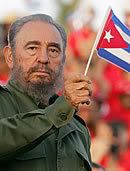
In 2008, Fidel Castro stepped down as President of Cuba after ruling his Communist regime for 49 years. Manuel Roig-Franzia, Uncertainty as Castro Steps Down, The Washington Post, Feb. 20, 2008,at A1, available at http://www.washingtonpost.com/wpdyn/content/article/2008/02/19/AR200802
1900147.html. An adversary to American Presidents since the Kennedy era, Castro's continued disregard for international standards of human rights has led this country to place a trade ban against Cuba for nearly 40 years. Despite his resignation, the US embargo against the country continues. See Cuban Liberty and Democratic Solidarity Act ( LIBERTAD), 22 U.S.C.A §§6021- 6091 (1996). However, it is an area of increasing criticism by many US citizens, congressmen, and foreign governments. With President Obama's April 2009 decision to allow travel to Cuba for Cuban-Americans and a democratically-ruled congress, some argue that the embargo could be on its way out. Leslie Clark, Cuban Trade ban stands despite rising efforts to end it, LEXINGTON HERALD LEADER, Sept., 10, 2009 available at http://www.kentucky.com/1084/story/929346.html. However, advocates of the trade ban hold to their belief in the embargo's ability to show civil disobedience to the Communist Nation and its new leader, the brother of Castro himself. The U.S. President's recent decision to renew the ban encourages those who believe civil disobedience is the proper course of action to take towards Cuba.
In 1996, LIBERTAD renewed and codified our country's efforts to limit assistance through trade with Cuba. See supra LIBERTAD. The legislature, in the enactment of LIBERTAD, grounded the trade ban in its stated desire to assist the Cuban people in regaining a democratic government. It found that Fidel Castro exhibited "continued violations of fundamental human rights." 22 U.S.C.A. § 6021(4) (1996). In its rationale, Congress felt the embargo would strengthen international sanctions of Cuba, encourage free elections of governmental officials, and protect US nationals from confiscatory takings by the Castro regime. See 22 U.S.C.A § 6022. To terminate the embargo, the President must find and report to Congress that a transitory government is in place. See 22 U.S.C.A § 2064(a). The President then may, upon consultation of Congress, work to terminate the embargo. See 22 U.S.C.A § 2064(c).
In the past, the motivation behind the economic isolation of the country withstood scrutiny. Recently,opposition has arisen, but on September 15, 2009, President Barack Obama decided to renew the embargo for another year, standing by his promise to allow Cuban-Americans to travel and send remittances to family there but maintaining the embargo. Juan O. Tamayo, White House renews trade ban on Cuba, MIAMI HERALD, Sept., 15, 2009, available at http://www.miamiherald.com/1264/story/1233997.html.
President Obama declared that he would not consider lifting the ban until Cuba "improves its human rights and frees political detainees." Nelson Acosta, Cuba Chides Obama over U.S. Trade Embargo, Sept., 16, 2009, available at http://www.canada.com/business/Cuba+chides+Obama+over+trade+embargo/2000661/story.html. Many would suggest that his statement seems arbitrary in light of the fact that the embargo poses no serious problem upon the Cuban government. American-made Products Readily Available in Cuba, Miami Herald, Aug. 29, 2009 available at http://www.miamiherald.com/embargo/story/1209009.html. U.S. goods still get into the country on the black market, and the embargo only serves to make the prices of said goods astronomical, furthering the economic divide between the rich and poor in Cuba. See id. Furthermore, the embargo gives the Communist government more fuel with which to blame America for the plight of the increasingly poor nation. With these facts, despite an admirable stand to articulate, we must accept the substance and reality of the thing. If American goods cause this much damage and could do so much more good by legalizing trade, should we not be willing to swallow our pride and try a different way?
No comments:
Post a Comment